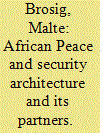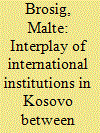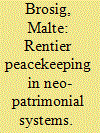| Srl | Item |
| 1 |
ID:
134341


|
|
|
|
|
| Summary/Abstract |
This article presents survey data on the African Peace and Security Architecture (APSA). It focuses explicitly on two aspects: the internal constitution and achievements of the APSA; and coordination and cooperation with external actors, such as Regional Economic Communities, the United Nations and the European Union. The survey, conducted between October 2011 and December 2012, targeted 198 security experts in international organisations, think tanks, academia and non-governmental organisations. It reveals the APSA's current stage of development, achievements and challenges.
|
|
|
|
|
|
|
|
|
|
|
|
|
|
|
|
| 2 |
ID:
131104


|
|
|
|
|
| Publication |
2014.
|
| Summary/Abstract |
Since 2003 the EU has launched 16 peacekeeping missions in Africa in most cases in cooperation with the UN. Therefore, this article takes an inter-organizational perspective on the EU's peacekeeping activities in Africa. Theoretically the article makes a contribution to the growing literature on inter-organizational approaches by applying niche selection and resource exchange theory to the field of security studies. The paper finds that EU missions in the past followed a targeted and niche approach in which it has played a facilitating but not dominating role in UN peacekeeping operations. However, in order to make effective use of this targeted approach the EU and UN are currently engaging in a substantial reconstruction of their relationship by building an interlocking peacekeeping architecture in which elements of resource pooling are central.
|
|
|
|
|
|
|
|
|
|
|
|
|
|
|
|
| 3 |
ID:
108659


|
|
|
|
|
| Publication |
2011.
|
| Summary/Abstract |
This article examines the interplay of international institutions in Kosovo and aims at disentangling and explaining the emergence and persistence of this international 'interim' regime. In 1999, the UN mission to Kosovo (UNMIK) and the Organisation for Security and Cooperation in Europe (OSCE) were the leading institutions in the civilian area following NATO's deployment of Kosovo Force (KFOR). Following the failed status talks on Kosovo, the EU's rule of law mission (EULEX) and the establishment of an International Civilian Office (ICO) have been set up in addition for increasing institutional complexity. The article analyses how institutional complexity is emerging and what strategies international institutions are applying when confronted with policy overlap. The paper finds that the emergence of institutional complexity in Kosovo is largely a result of historical lock-in effects. International institutions have developed two dominant strategies to cope with dense institutional spaces. First, they show signs of a functional convergence and a coordinated pooling of resources. Second, institutions have developed niche competences to avoid competition.
|
|
|
|
|
|
|
|
|
|
|
|
|
|
|
|
| 4 |
ID:
192918


|
|
|
|
|
| Summary/Abstract |
Since Germany joined the United Nations (UN) in 1973, it served six times as an elected member of the UN Security Council. The main aim of the article is to evaluate Germany’s latest term (2019–2020). What policy space can elected members occupy given the still unreformed Council? Germany is selected as a case study, because it is a pivotal regional power with the potential to exert significant influence on the Council. The article provides an in-depth overview of Germany’s performance and explores those conditions which shape and steer its positions as an elected member. Three conditions are particularly relevant: diplomatic capacity, the effective use of Council rules and procedures, as well as the ability to forge coalitions. As a regional powerhouse and adamant endorser of multilateralism, the expectations toward Germany are high, however, has the country lived up to them?
|
|
|
|
|
|
|
|
|
|
|
|
|
|
|
|
| 5 |
ID:
152383


|
|
|
|
|
| Summary/Abstract |
International peacekeeping in Africa has developed dynamically in the last decade. The majority of global missions are deployed to the continent, the largest regional contingent of troops comes from Africa, and the African Peace and Security Architecture has made significant progress. Peacekeeping is Africanized today more than at any time before. However, mainstream research has insufficiently paid attention to African agency in this context. This article sheds light on the often neglected influence of African politics on international peacekeeping missions. The focus is set on the consequences of neo-patrimonial political systems, which can use international peacekeeping missions as an opportunity to generate rents. It will be shown that such a rent-seeking approach is highly problematic for the troop-contributing as well as mission-hosting countries. Instead of curbing conflict, rentier peacekeeping is prolonging and exporting it. The empirical examples used are the Burundian and Kenyan involvement in peacekeeping in Somalia.
|
|
|
|
|
|
|
|
|
|
|
|
|
|
|
|
| 6 |
ID:
174781


|
|
|
|
|
| Summary/Abstract |
China’s engagement in South Sudan has been branded a crucial test case for the country’s foreign and security policy in Africa. Investment in the oil sector is significant, and Chinese political engagement in conflict mediation and peacekeeping are unparalleled. Will the experiences gathered provide China with reasons to extend its engagement, is South Sudan a model or exceptional case? In this context three sectors will be explored: the economic, political and security sphere. This article finds that there are few reasons to assume that South Sudan is a role model. Access to oil was never critically important, and oil revenue is fuelling the conflict. The Chinese model of developmental peace and conflict mediation preferring non-punitive diplomacy are problematic. The peacekeeping mission could not stop the fighting but succeeded in setting up civilian protection sites. In sum, the South Sudan engagement has not produced favorable outcomes and is unlikely to be replicated.
|
|
|
|
|
|
|
|
|
|
|
|
|
|
|
|
| 7 |
ID:
169234


|
|
|